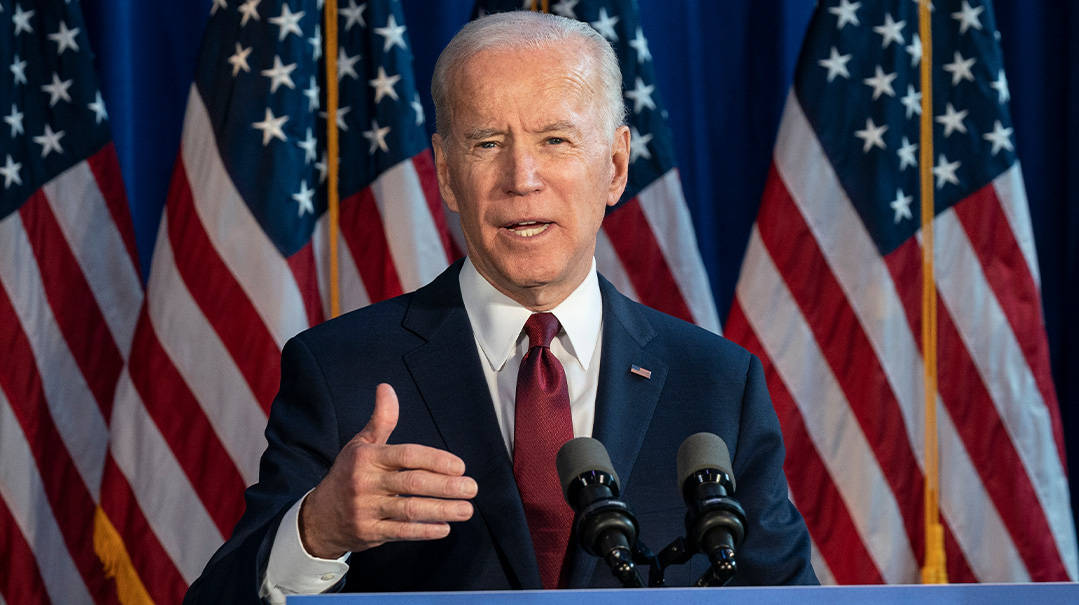Biden Bids for the Center

He's still not declared, but Biden's campaigning

President Joe Biden’s State of the Union address was no ordinary speech. First of all, one couldn’t help but be reminded of the Israeli Knesset, what with all the heckling and verbal sparring between Biden and Republican House members, a rare sight in American politics.
But beyond that, the speech was likely Biden’s unofficial 2024 campaign launch. As such, it dealt almost exclusively with the high cost of living, with hardly a single reference to the culture wars, race, or gender. In addition, it was evident that the president came well prepared. There were hardly any verbal stumbles, and his appeal to Republicans to take action on the debt ceiling included some carefully laid traps regarding cuts to Medicare and Social Security.
Biden also spoke about the need for more factories, more jobs, securing the border, and lowering the price of fuel. In campaigner’s slang, this is called a “finish-the-job speech,” meant to give voters an impression that a great deal of work is going on — it hasn’t been finished yet, but it will be in the next term.
And in the absence of issues such as climate and race, and with foreign policy taking up no more than five minutes, we ended up getting a very centrist speech, which is surprising, given that Biden marketed himself to unenthused younger voters as “the most progressive president of all time” at the start of his term. Again, that’s how the president’s team tried to market him to the leftist wing of the party. Listening to Biden’s recent State of the Union address, there wasn’t a trace of that sentiment.
“I think the reason the president’s terrific — and very well-received — SOTU remarks were very disproportionately domestic-oriented is that, with the huge exception of Ukraine-Russia, which he addressed at length, that’s what Americans want most to hear about right now,” says Steve Rabinowitz, a Democratic strategist and founder of Bluelight Strategies.
Rabinowitz dismissed the notion that the speech represented a pivot to the center, or that the left flank of the party would reject the sentiment.
“No pivot. Biden routinely talks about the manufacturing and the economy, and why shouldn’t he? They are among his strongest suits. And everyone in my party is on board with this agenda — everyone. There will eventually be some differences about some priorities, but for now, not about where he should be on what.”
Mark Mellman, top Democrat strategist and CEO of the Mellman Group, said the president’s SOTU focused on the priorities of the American people — holding down the cost of living and making our economy work for everyone: “President Biden told the American people he has their back, he’s delivering for them, and told Congress that the job needs to get finished. It was a smart speech well delivered.”
Tevi Troy, former White House aide and author of Fight House: Rivalries in the White House, from Truman to Trump, said that Joe Biden gave “a speech carefully tailored to appeal to his various constituencies.”
“In many ways, the address appeared to be a kickoff to his 2024 campaign, with his repeated calls to ‘finish the job’ and his attempt to paint the Republicans in a box on renouncing any and all changes to America’s fiscally strapped entitlement programs,” said Troy. “Biden tends to have more agreement within his base on the large spending programs that have been his signature for his first two years than on more complicated foreign policy questions, such as what to do about China and the recent Chinese spy balloon incursion into the US, which were barely noted in the speech. The speech gave us a sense of what to expect in a 2024 Biden campaign — lots of spending promises and little serious consideration to America’s very significant fiscal and foreign policy challenges.”
Sam Markstein, RJC’s national political director, said, “President Joe Biden’s move to the center comes in the wake of two years of kowtowing to ascendant left-wing elements in the Democratic Party.
“Now that his policy priorities have left average Americans struggling to make ends meet, he wants to come to the table and compromise. Time will tell if this middle-ground stance will last,” said Markstein. “Americans remember his promises of unity in 2020, and his consistent failure to deliver.”
(Originally featured in Mishpacha, Issue 949)
Oops! We could not locate your form.







